|
What is dialysis? When do patients require dialysis? What types of dialysis are there? What does the patient do during dialysis? What are the advantages of the different types of dialysis? How does a kidney dialysis machine work? What does a kidney dialysis machine do? What is a dialysis machine? When is a dialysis machine used? Does use of a dialysis machine hurt? How long is a dialysis machine used? Are there any potential complications associated with use of a dialysis machine? How long do hemodialysis treatments last? Is kidney failure permanent? Will dialysis help cure the kidney disease? |
|
What is dialysis? Dialysis helps the body by performing the functions of failed kidneys. When do patients require dialysis? The two major blood chemical levels that are measured are the "creatinine level" and the "blood urea nitrogen" (BUN) level. Usually, when the creatinine clearance falls to 10-12 cc/minute, the patient needs dialysis. You need dialysis when you develop end stage kidney failure --usually by the time you lose about 85 to 90 percent of your kidney function and have a GFR of <15. What is GFR? Here are further guidelines. What types of dialysis are there? There are two main types of dialysis: "hemodialysis" and "peritoneal dialysis." Hemodialysis uses a special type of filter to remove excess waste products and water from the body. Peritoneal dialysis uses a fluid that is placed into the patient's stomach cavity through a special plastic tube to remove excess waste products and fluid from the body. |
| Vascular Access for Hemodialysis |
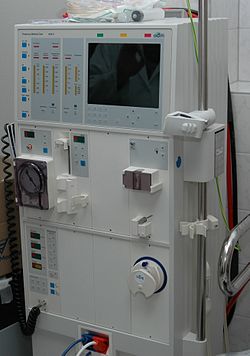 Hemodialysis machine |
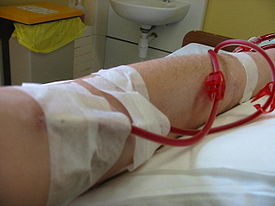 Hemodialysis in progress |
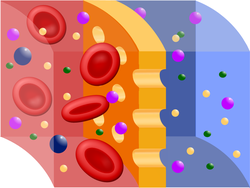
Semipermeable membrane |
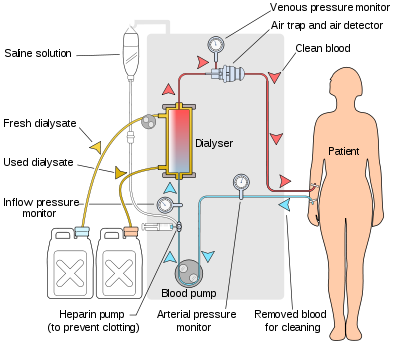 Hemodialysis |
 A hemodialysis unit's dialysate solution tanks |
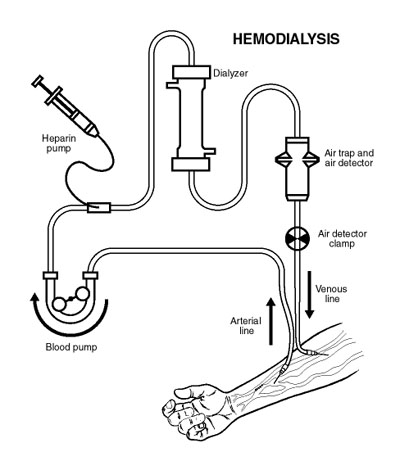
|
|
What is a dialysis machine?
A dialysis machine is a machine that cleans the blood of toxins when the kidneys are not working. The patient's blood enters the dialysis machine and goes through a special filter that works like the kidney to remove fluid and toxins from the blood. The use of the dialysis machine is termed hemodialysis. A patient undergoing hemodialysis must be connected to the hemodialysis machine by tubing that allows blood to flow to and from the dialysis machine. The tubing is connected to the patient by way of a dialysis shunt or catheter. When is a dialysis machine used? A dialysis machine is used when a patient's kidneys cannot effectively clean the blood. Does use of a dialysis machine hurt? The use of the dialysis machine does not hurt. How long is a dialysis machine used? The dialysis machine can be used for a short period of time or for a long period of time, depending on what is wrong with the kidneys. Are there any potential complications associated with use of a dialysis machine? The potential complications associated with the use of the dialysis machine are very uncommon and include bleeding and infection. During dialysis a patient's blood pressure may vary due to the fluid shifts. How long do hemodialysis treatments last? The time needed for your dialysis depends on: •how well your kidneys work •how much fluid weight you gain between treatments •how much waste you have in your body •how big you are •the type of artificial kidney used Usually, each hemodialysis treatment lasts about four hours and is done three times per week. A type of hemodialysis called high-flux dialysis may take less time. Is kidney failure permanent? Usually, but not always. Some kinds of acute kidney failure get better after treatment. In some cases of acute kidney failure, dialysis may only be needed for a short time until the kidneys get better. In chronic or end stage kidney failure, your kidneys do not get better and you will need dialysis for the rest of your life. If your doctor says you are a candidate, you may choose to be placed on a waiting list for a new kidney. Will dialysis help cure the kidney disease? No. Dialysis does some of the work of healthy kidneys, but it does not cure your kidney disease. You will need to have dialysis treatments for your whole life unless you are able to get a kidney transplant. Here are further guidelines. |
